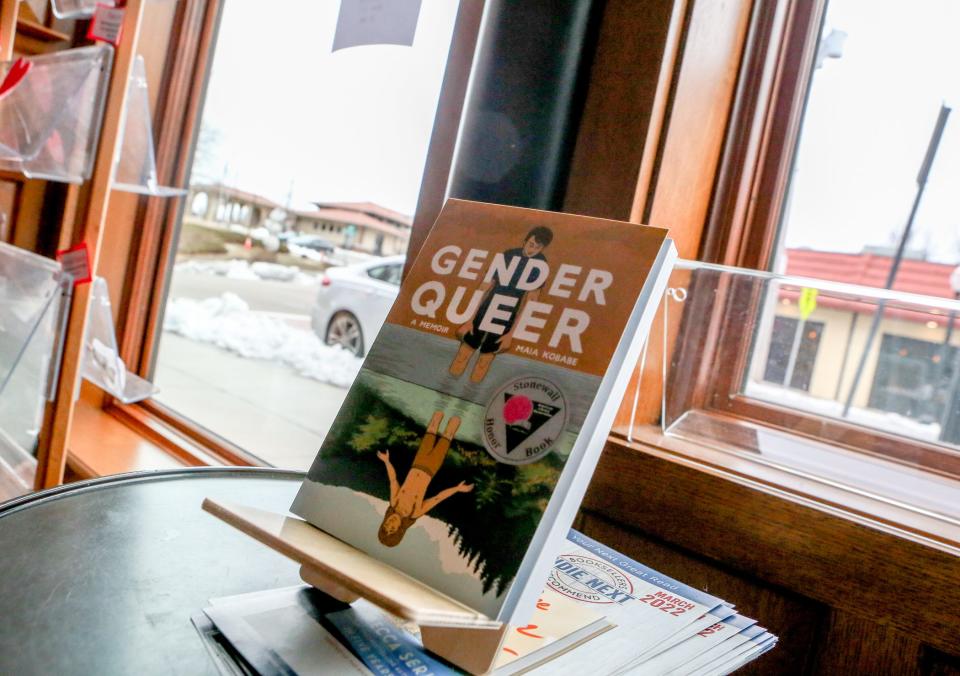Lawmakers are bringing the book ban wars to Rhode Island. Here's how.
- Oops!Something went wrong.Please try again later.
- Oops!Something went wrong.Please try again later.
- Oops!Something went wrong.Please try again later.
A small group of House lawmakers are attempting to criminalize "public and charter school" librarians for allowing children to access "obscene" books. Only this time, politicians want to broaden the state's existing obscenity law to include "cartoon or animated" materials, such as graphic novels.
Any school librarian involved in providing such books deemed "obscene" could face two years in prison and a $1,000 fine under the new bill, which was introduced to the Judiciary Committee in late April.
That means books like Maia Kobabe's "Gender Queer," which has become one of the most banned books in the U.S. for its sexual imagery, would be banned from Rhode Island schools — if supporters of the bill amendment get their way.
Rep. Patricia Morgan, the only Republican sponsor, identified that book as one she thinks must go, along with Alison Bechdel's "Fun Home," an illustrated book about Bechdel's growing up, her coming out as lesbian, and her closeted gay father's subsequent death by suicide. Morgan also singled out Susan Kuklin's "Beyond Magenta," a young adult book about transgender teens.

All three books have been caught in the middle of the nation's political fights over education on sex and gender identity which have now come to Rhode Island, even if only waged by a minor group of legislators unlikely to be successful.
"Protecting our children from inappropriately sexually-explicit materials is a long held public policy," Morgan said. "Parents have restricted access to school libraries and thus, are not aware of the pornographic content of books that are being offered in the children’s sections of public libraries and in our schools."
Seven Democrats are also sponsoring the bill: Reps. Samuel Azzinaro, Deborah Fellela, Arthur Corvese, Patricia Serpa, Gregory Constantino, Charlene Lima and Edward Cardillo. However, when asked for comment — including for an explanation of the inspiration for the bill — none replied by the time this article was filed.
More: Critics sound alarm over 'Don't Say Gay'-style bill in RI legislature. Here's what it says.
Two warring amendments at play in fight over books
Beatrice Pulliam, head of the Rhode Island Library Association, which represents nearly 500 library staff in the state, said the bill was a clear response to a different proposed amendment to the same law — one that would protect librarians from being criminalized.
That measure was introduced in early March, nearly two months before the competing amendment.
The measure states that if prosecution arises, "it is an affirmative defense that the defendant was a bona fide school, museum, or public library, or was a person acting in the course of employment as an employee or official of such organization."
Pulliam said her association was "disappointed, but unfortunately not surprised" to see the restrictive bill later introduced as a response.
"It's just another effort to criminalize teaching about health and sexuality, or circulating books with information about sex, or books that are LGBTQIA-positive," Pulliam said. "We think it's really dangerous that a very vocal but small minority of uninformed politicians are basically playing whack-a-mole with our intellectual freedom."
More: The 13 most banned books of 2022: 'Gender Queer' tops library association's list for second year
RI has an existing obscenity law, but is it ever enforced?
Under current law, judging that a book, movie, or other material is "obscene" is determined by what is offensive under "contemporary community standards." But figuring out those standards can be a rather nebulous task.
Steven Brown, executive director of the Rhode Island arm of the American Civil Liberties Union, said it's "very rare" that the law is used, but when it is, the standards are defined by U.S. Supreme Court Cases from the 1960s and 1970s that dealt with this very question. Think Miller v. California, a 1973 case in which Chief Justice Warren Burger established a three-pronged test for obscenity: "Whether the average person, applying contemporary community standards, would find that the work taken as a whole, appeals to the prurient interest; whether the work depicts or describes, in a patently offensive way, sexual conduct specifically defined by the applicable state law; and whether the work, taken as a whole, lacks serious literary, artistic, political, or scientific value."
Yet Brown said criticism of so-called community standards continues today.
"It is extraordinarily vague and open-ended," Brown said. "And it also means that a book or other material could be illegal ... for one community in one state and lawful in the other, depending on these amorphous community standards. And that's been one of the big criticisms about trying to ban obscenity, generally."
Brown doesn't believe the latest attempt to put restrictions on schools will pass, but he recognizes it is no coincidence that the bill was introduced.
"There is a nationwide campaign right now to try to censor the teaching that goes on in schools on important and controversial subjects and to remove books from libraries that offend certain people," he said. "At some point I think this will pass. This is not the first time there's been a wave of censorship in this country. It recurs. We're in a bad period right now, but I'm hopeful that that it will pass at some point soon."
This article originally appeared on The Providence Journal: Banned books in RI could expand under proposed bill aimed at school libraries

